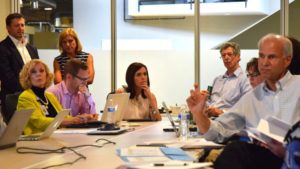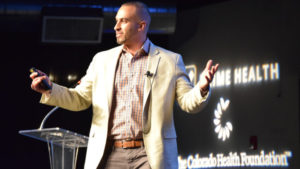DENVER, Colo. – For the past three years, Prime Health has been driving the adoption of innovation within the healthcare system through its annual Prime Health Challenge. Last Wednesday, several health-tech entrepreneurs gathered at the co-working space Industry to discuss their experiences in the program.
“Innovation is hard,” said Jeffrey Nathanson, CEO of Prime Health. “Integration is hard. We’re in the process of evaluating the 15 pilots we’ve funded so far. We’ve learned that for our host institutions to adopt innovation, they need a road map.”
Prime Health’s annual Challenge begins with a call for applications from health-tech startups. Once the applications have been collected, Prime Health convenes dozens of clinicians, entrepreneurs, and executives to evaluate each applicant according to a rigorous process known as Prime Health Qualify. Those startups identified as ready for integration into the healthcare system are then given the chance to pitch pilot proposals to a panel of payers and providers.
“We’ve qualified 69 companies according to this process,” explained Nathanson. “We’ve funded pilots for 15 of them with $430,000 from the Colorado Health Foundation. We think it’s a good start for a two-and-a-half year old organization.”

Before each Challenge, the members of Colorado’s health innovation ecosystem convene to assess the applicants.
At Wednesday’s meet-up, former Challenge participants were invited to share their experiences as part of an effort to gauge the effectiveness of the program.
“No individual or organization has had more impact on our success than Prime Health,” said Chip Brunk, CEO of Test Appropriate. “Since the Challenge, we’ve been getting a lot of interest in the company and our valuation has gone up significantly.”
Test Appropriate has developed a clinical decision support tool that helps clinicians select the most affordable and appropriate tests for their patients. According to Brunk, the pilot his company obtained through the 2015 Prime Health Challenge allowed it to enter the market much earlier than expected.
“We felt very fortunate to stand on that stage and have Aetna and Kaiser sitting in the audience,” said Dr. Lauren Costantini, CEO of Prima-Temp. “We never would have met all of those people on our own, and certainly not at the same time.”
Prima-Temp is the maker of Priya Ring, a fertility solution that combines a wearable sensor with a smartphone app to let women know when they are most fertile. According to Dr. Costantini, participating in the Prime Health Challenge enabled her company to establish relationships with a wide range of investors.
“We were happy that both of our pilot opportunities were small,” said Theresa Szczurek, CEO of Radish Systems. “We had previously done a pilot with a large payer organization. It was extremely slow-going in terms of decision making.”
During its pilot with Clinica Tepeyac, a small, Denver-based safety net provider, Radish Systems identified several uses for its voice-with-visuals technology, including health coaching and patient education. Clinica Tepeyac is currently expanding its use of Radish System’s technology to assist with its diabetic population.

At the 2016 Prime Health Challenge, eight startups pitched to 15 payers and providers.
“I was getting ready to fold up my camp and go home,” said Bob Goodman, CEO of RxAssurance, a semi-finalist in the 2014 Prime Health Challenge, “when David Brody from Denver Health walked up and said, ‘I’m sorry you weren’t successful, but we want to do a pilot with you anyway.’ And we did, and we were successful.”
RxAssurance’s pilot with Denver Health led to the creation of Improve My Health, a telemedicine platform that helps patients eat healthier and drink and smoke less. Since the 2014 Challenge, RxAssurance has also developed Opi-Safe, a prescription-management system that is currently being rolled out in healthcare systems across the country.
Several of the finalists of the 2016 Prime Health Challenge were also present at Wednesday’s meeting. Chris Lee, chief product officer at Quantant Share, reported on his startup’s pilot with the medical practice Doctors Care. David Shine, CEO of dBMEDx, discussed the number of connections that participating in the Challenge had allowed his company to make.
“We were able to get a pilot with Denver Health,” said Dr. Lisa Rue, CEO of Preventative Technology Solutions. “Kaiser Permanente has shown interest as well.”
To further accelerate the spread of new technologies throughout the healthcare system, Prime Health is developing a database of best practices in innovation adoption, Nathanson announced at the end of the meet-up. Alongside Prime Health’s public events and its online collaborative platform, Prime Health Collaborate, the database will provide Colorado’s thriving health innovation community with yet another strategic asset.
“Get involved with Prime,” Goodman said in closing. “Get involved with Innosphere, Catalyst HTI, and Innovation Pavilion. Five years ago, this was an idea. And now we’re the number one health innovation ecosystem in the world.”
Like the coverage that CyberMed News provides? Follow us on Twitter, LinkedIn, and Facebook to keep up-to-date on the latest developments in digital health.





With this in mind, Prime Health is working closely with the State of Colorado s eHealth Commission, as well as its Office of Health Innovation, which oversees the development of policy regarding the funding of Medicaid in Colorado. Innovators in our state have access to co-working spaces like Galvanize, accelerators like TechStars, and incubators like Innovation Pavilion.